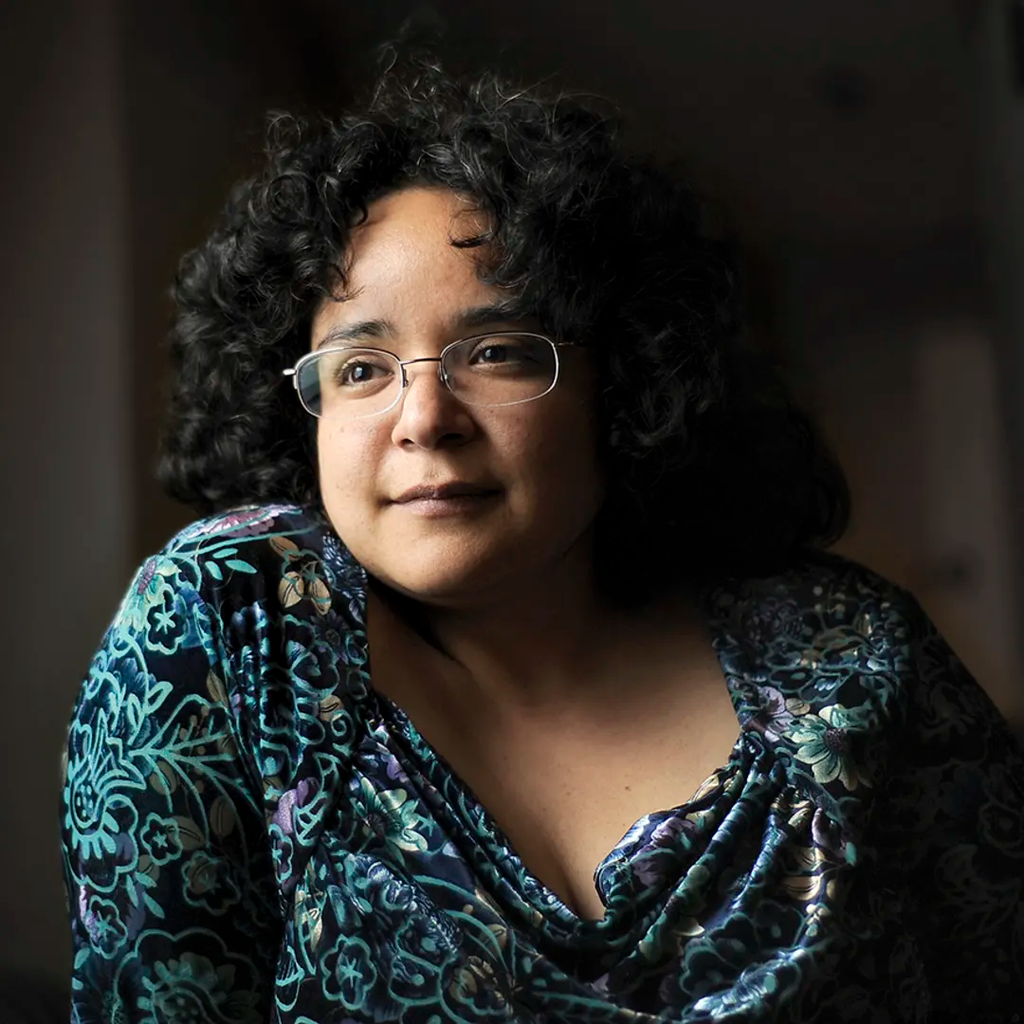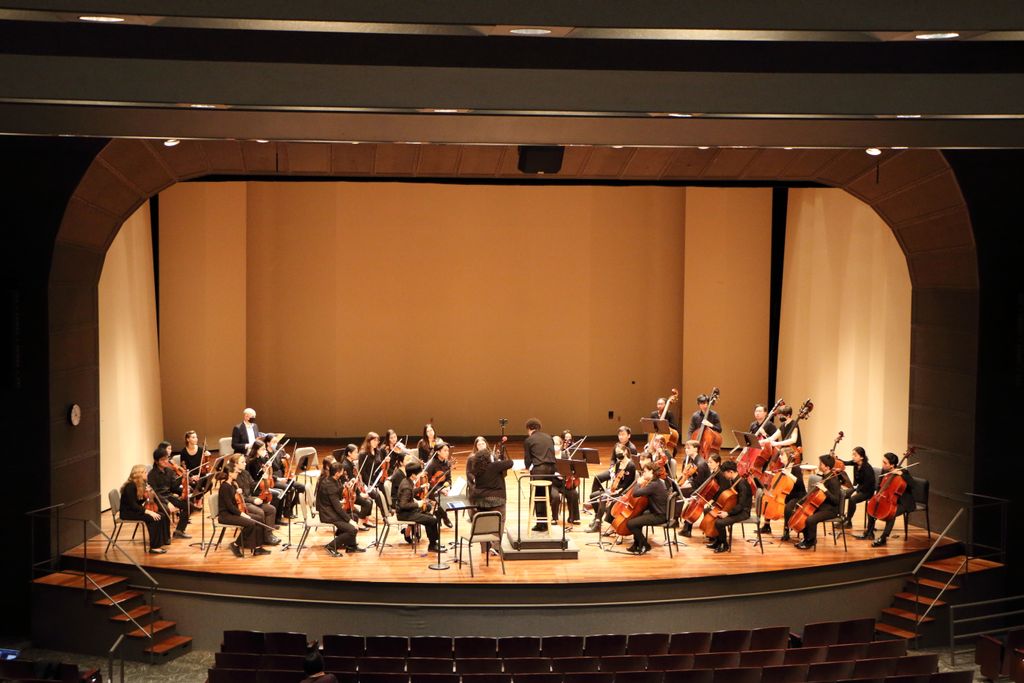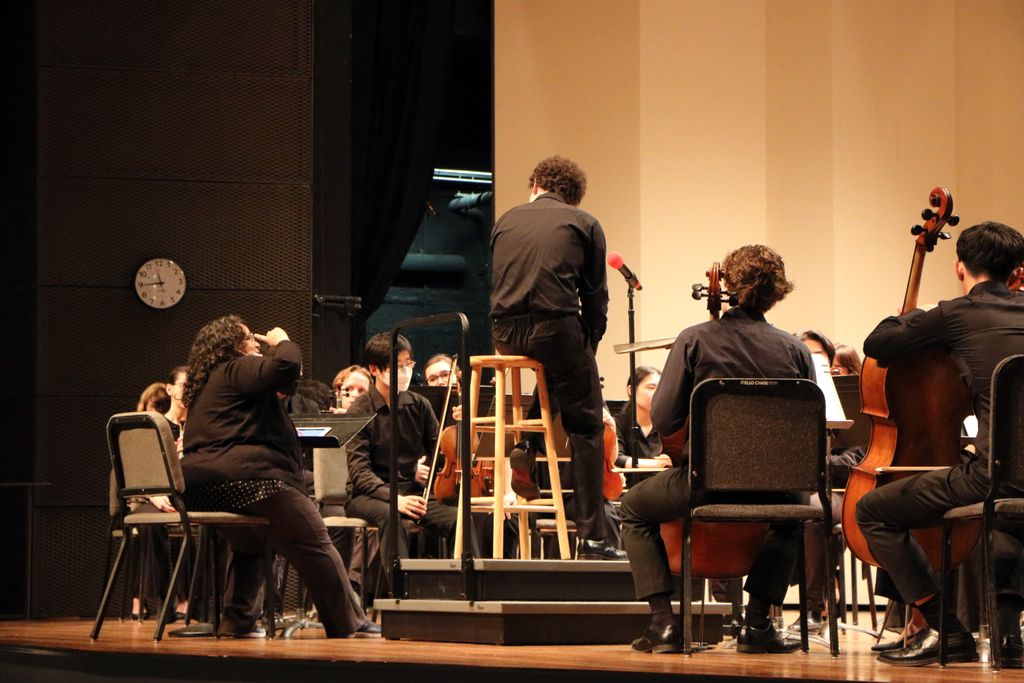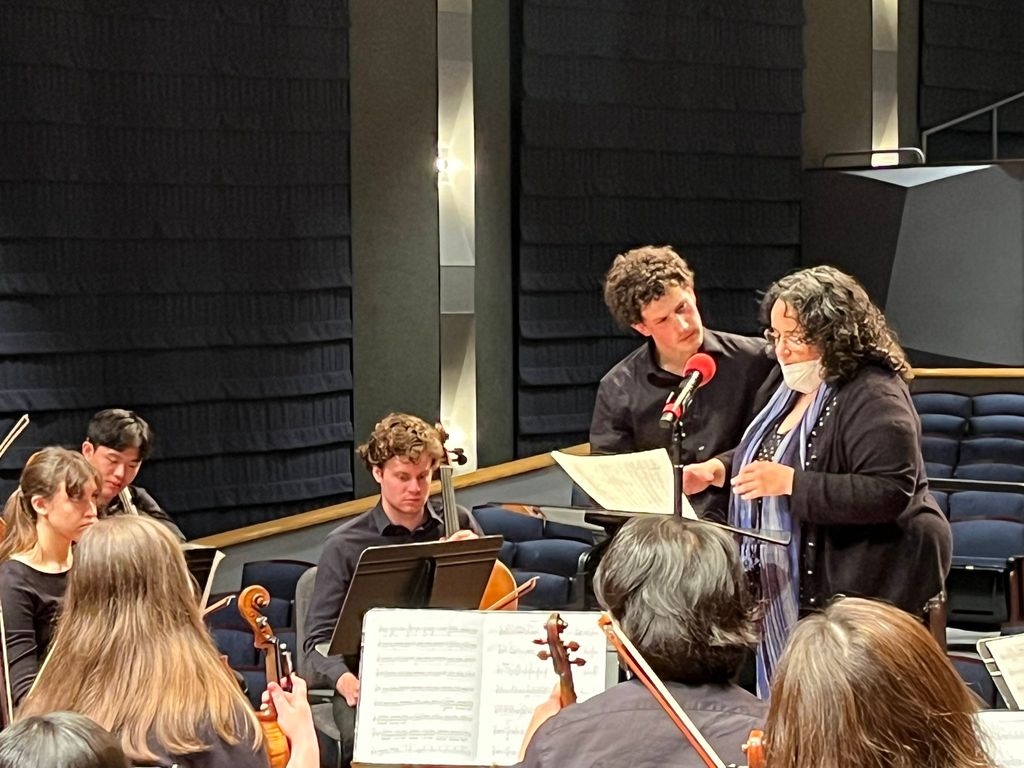Owning One’s Self-Expression in Music: Composer Gabriela Lena Frank’s Philosophy

Top row (left to right): Daniel Doña, Senior Lecturer in Music, Viola; Hudson Ye Hyung Chung (CFA’24) PD Violin Performance; Lucia Lin, Professor of Music, Violin. Bottom row (left to right) James Burton, Director of Orchestral Activities and Master Lecturer, Music; Gabriela Lena Frank, Visiting Artist, Composer, and Pianist; Fernando Gaggini (CFA’24) DMA Orchestral Conducting
Owning One’s Self-Expression in Music: Composer Gabriela Lena Frank’s Philosophy
Art is a communal form, one that is wrought with love and joy but also so often shame and fear. Despite our resiliency, the unfiltered expression of our hearts through art creates a soft and tender spot that can so easily get ahead of us, staunching our individuality and our tenacity. Gabriela Lena Frank, a self-described cultural witness and storyteller through the language of melody and rhythms rather than words, makes her art –her stories– because of and with this tender resilience.

Frank tells the stories of her Latina partially Deaf hippy self that writes symphonies for a living after being trained in classical music, saying “If I do my job right, there’s a larger sense of humanity behind it.” She never conformed to what people would assume of her, taking action in the climate crisis through music, uplifting incoming composers who are the future of the art form, and continuing to pursue curiosity in exploring her own individuality and ownership of her art.
As part of the 150th-anniversary celebration for the BU School of Music, students and faculty welcomed Frank for a three-day residency in the Spring 2022 semester from February 21-23. The events began with a keynote on her alumni program for her Creative Academy of Music, Composing Earth, continued with open rehearsals and performances of Frank’s work by School of Music students and concluded with chamber music masterclasses, composer groups classes, and discussions about social activism and the climate crisis with regard to music and storytelling.
Cultivating ownership of a musician’s piece
Natalie Darst Xia (CFA’24), who is currently earning her Doctor of Musical Arts in Violin Performance with Professor of Music, Violin Lucia Lin, worked with Frank on her solo violin piece, “Khazn’s Recitative: Elu D’vorium” (2003) in an open rehearsal before performing it in the concert dedicated to Frank’s work. Natalie reflects on her time with Frank, saying, “There was a wonderful moment when Ms. Frank had me spend one minute to publicly ‘practice’ my phrasing and vibrato in front of my professors and colleagues in the open rehearsal. After experimenting for about forty-five seconds, I finally played the phrase that brought the music to life, and I immediately sensed a shift in attention from the listeners in the room. It was this feeling of ownership and intentional communication (qualities embodied by Ms. Frank and shared throughout the week) that made this my favorite moment from her residency.”
After experimenting for about forty-five seconds, I finally played the phrase that brought the music to life, and I immediately sensed a shift in attention from the listeners in the room. It was this feeling of ownership and intentional communication (qualities embodied by Ms. Frank and shared throughout the week) that made this my favorite moment from her residency.
During her residency, Frank stressed the importance of “cultivating ‘ownership’ of a piece in addition to conveying the intentions of the composer.” There is a very delicate balance between composer and performer and how they interact. Professor of Violin and good friend to Frank, Lucia Lin relates that musicians sometimes forget to focus on the music itself. “We are so ensconced in how technically to do things,” says Lin. “The music is the most important thing and we kind of get caught up in the fear of doing the wrong thing. Fear is always the thing that clips our wings.” It is the performer’s job to move an audience. They will only be moved by what the music and musician do together: the self-expression of music.
According to Lin, Frank is “not one to squash someone’s individuality… She’s creating these spaces for people to put themselves into the music and not feel shame.” During her residency, Frank maintained the message that the performers own the music they’re playing in a way, thanks to a sort of contract between the musician and composer where you have a job–a responsibility–of putting your own musical self into the piece.
Same music. Different people.
During her BU visit, Frank hoped that students realize just how much their ownership, their individuality, but most of all themselves, are needed. “The world really needs them,” says Frank. “They’re needed as who they are: to not try to conform but to work on presenting the best version of themselves” as boldly as they can be. Frank is very proud to have spent time with SOM students, colleagues, and friends. She understands the importance of talking to those she sees as her younger siblings in the field. She sees herself here kind of like a time traveler from her own time in conservatory in the ’90s.

As she walks down the halls of CFA, she can hear the same music being played from classrooms and the same competitions along the bulletin boards. But the people are different. She’s different. She can say, “this is how it was from now and this is where you might want to look in the future.” She can do the same she does with her music, checking in with her childhood Hello Kitty and X-Men loving self, her conservatory young adult, and her current environmentalist, teaching, nonprofit-running self. She laughs joyfully at the thought that, if she’s a time traveler from the past, incoming artists like the students in SOM “are a glimpse into the future.” She’s able to look back on her life and the things she went through with new eyes–eyes that her composers and students gifted her that she didn’t have before.
This exchange of energy and insight is very powerful for Frank. With this, she can reinforce, recontextualize, and sympathize with the feelings and experiences of her younger self by supporting them. She has the ability to continue to remind young people that, “Your feelings are probably right. We may need to understand them better but don’t discount them. They’re probably telling you something.” As we get older, we use those pieces of ourselves to influence our art and imaginations–almost a “rewriting of history, enhancing our memory to be more pleasant or make sense.”
Frank remembers the guests she met while she was in school. They made a big impact on her, even if they were only there a day or two. She takes invitations like this residency very seriously, trying her hardest to take them whenever they come her way. She truly believes in the power of young artists and the power or clout established artists have in aiding the up-and-coming. “We need to think about all emerging artists as needing advocacy and needing assistance, especially from the generation before them,” says Frank. She has the credibility to do that. She knows very well that in order to make an impact, “you have to go body by body, person by person. And move urgently.” And she does tenfold.
We need to think about all emerging artists as needing advocacy and needing assistance, especially from the generation before them.
Photo Gallery of Frank’s Visit




